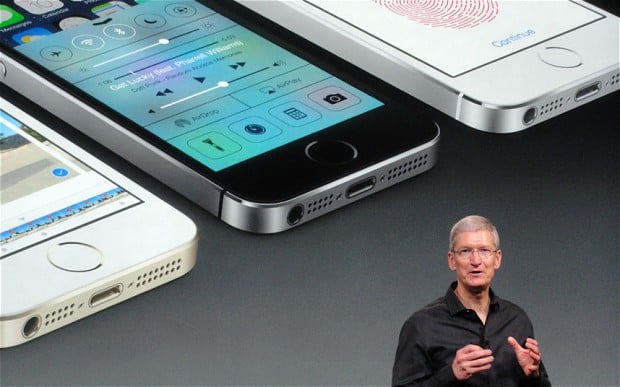Dead. Apple.
Two words that you’d never suggest belonged in the same sentence. Especially since this is one of the most valuable companies in the world with a market cap of $426B. Plus, there’s that tidy little sum of $42 billion (yes that’s billion) in cash reserves (as of last quarter, including short-term investments) sitting in the corner begging to be spent (Pinterest? Foursquare? Yelp?).
But there’s a real fundamental problem with Apple.
That is, if the company itself is not literally dead–and let’s be realistic, it’s not going anywhere anytime soon–it’s ability to innovate certainly appears to be moribund.
Yesterday’s announcement, featuring one slightly upgraded iPhone (5S) and one slightly discounted iPhone (5C), did little to demonstrate that the company can compete in a post-Jobs world. There was no oooh-aaah moment; something we had become accustomed to seeing in years gone by. Breaking new ground wasn’t the order of the day either. CEO Tim Cook could’ve dazzled and unleashed an unexpected new product (smartwatch, Google Glass competitor, 5-inch killer iPhone… something!) and perhaps created an entirely new market segment. After all, Apple does this all the time–historically at least. In 2007 the company kicked off the Golden Age of mobile with the iPhone. Then, brilliantly and defying all odds, Jobs in 2010 introduced us to the iPad. It wasn’t just a product, it was a lifestyle. The PC is dead, long live the PC!
No question, Apple did show us some new stuff. iOS 7 is refined, polished. Fingerprint scanning in the new iPhones works extremely well, and is a handy feature. iTunes Radio music streaming service is welcome–though long overdue (see Pandora).
And while tech blogs continue to fawn over the new iPhones (especially the 5S), analysts are not buying any of it.
Credit Suiss, Bank of America, and UBS all downgraded Apple stock (AAPL) today. Most of that pessimism comes from the 5C, which many see as still a premium model, and not cut-rate enough to grab market share in developing countries where it’s targeted.
Revenue and operating income are down substantially over the last three quarters.
From my perspective the bigger concern is Apple’s apparently ability to bring anything innovative to market.
Samsung is innovating (Gear). Google is innovating (Glass, Now, Android). Heck, even Microsoft is innovating (Xbox One, Nokia, Surface 2) … or at least trying.
To stay ahead in the consumer tech space, Apple will need to keep rolling out shiny, new stuff that changes our perceptions of what it is to interact with otherwise vanilla products. Granted the P/E (~ 11) on APPL stock is not stratospheric, but it means that incrementalism, as seen with the latest product announcements, puts the company on a decidedly slower growth curve. Growth may not even be the operative word.
Failing is Okay.
Under Jobs, Apple failed mightily and often: Ping (the ill-fated social music network), Lisa, Newton, Appleworks… the list goes on. That boldness, though, to try crazy new things, to push the envelop, and to challenge the norm, was exactly what propelled the company to incredible new heights in the 2000s. It was not operational expertise; as important as that is, vision and R&D have traditionally driven success in Silicon Valley.
To be fair, Google hasn’t done a whole lot this year. Despite the hype surrounding Moto X (a decent phone), it’s more of an incremental update than it is a gamechanger. And there’s been no major update to Android so far this year. Like Google, in lieu of any substantial engineering progress in the form of shipping products, Apple too resorted to color as a marketing lever (see A Colorful Year for Mobile). But, Gold?!
Maybe we’re asking too much of Apple?
It already invented the graphical mouse-based interface, the all-in-one PC, the smartphone, and the tablet.
But since when have we tempered our expectations when it comes to the most famous tech company of all time?


